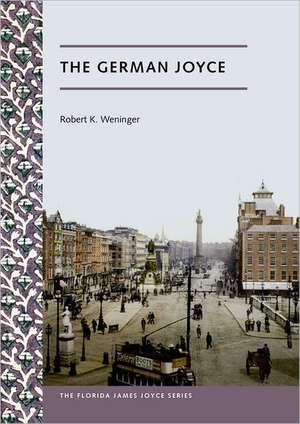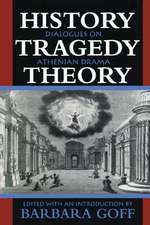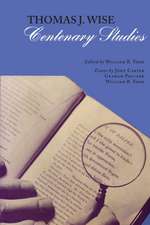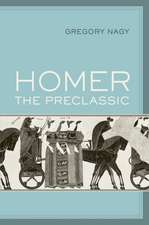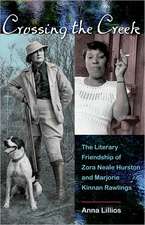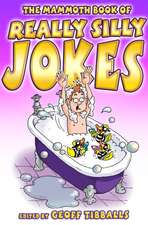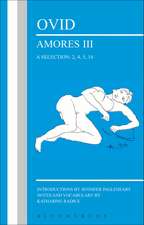The German Joyce: Florida James Joyce (Hardcover)
Autor Robert K. Weninger Sebastian D. G. Knowlesen Limba Engleză Hardback – 31 iul 2012
Preț: 446.38 lei
Preț vechi: 525.15 lei
-15% Nou
Puncte Express: 670
Preț estimativ în valută:
85.42€ • 89.82$ • 70.58£
85.42€ • 89.82$ • 70.58£
Carte tipărită la comandă
Livrare economică 17 aprilie-01 mai
Preluare comenzi: 021 569.72.76
Specificații
ISBN-13: 9780813041667
ISBN-10: 081304166X
Pagini: 257
Dimensiuni: 157 x 236 x 23 mm
Greutate: 0.52 kg
Editura: University Press of Florida
Seria Florida James Joyce (Hardcover)
ISBN-10: 081304166X
Pagini: 257
Dimensiuni: 157 x 236 x 23 mm
Greutate: 0.52 kg
Editura: University Press of Florida
Seria Florida James Joyce (Hardcover)
Textul de pe ultima copertă
Extraordinarily well done and welcome. A subtle, nuanced, and brilliant work of reception theory, intertextuality, historical scholarship, literary criticism, and historical and cultural (and political) history. The number of important and fascinating writers, artists, intellectuals, cultural figures, scholars, and critics that Weninger perceptively discusses is not only impressive, it s staggering. Morris Beja, coeditor of "Twenty-First Joyce"
The first comprehensive account of the enormous impact of Joyce on German modernist and postmodern writers. An indispensable book on Joyce s German face. Gerald Gillespie, Stanford University
In August 1919, a production of James Joyce s "Exiles" was mounted at the Munich Schauspielhaus and quickly fell due to harsh criticism. The reception marked the beginning of a dynamic association between Joyce, German-language writers, and literary critics. It is this relationship that Robert Weninger analyzes in "The German Joyce."
Opening a new dimension of Joycean scholarship, this book provides the premier study of Joyce s impact on German-language literature and literary criticism in the twentieth century. The opening section follows Joyce s linear intrusion from the 1910s to the 1990s by focusing on such prime moments as the first German translation of "Ulysses," Joyce s influence on the Marxist Expressionism debate, and the Nazi blacklisting of Joyce s work. Utilizing this historical reception as a narrative backdrop, Weninger then presents Joyce s horizontal diffusion into German culture.
Weninger succeeds in illustrating both German readers great attraction to Joyce s work as well as Joyce s affinity with some of the great German masters, from Goethe to Rilke, Brecht, and Thomas Mann. He argues that just as Shakespeare was a model of linguistic exuberance for Germans in the eighteenth century, Joyce became the epitome of poetic inspiration in the twentieth.
Robert K. Weninger is professor and chair of German at King s College London. He has authored or edited over ten books, including" Arno Schmidts Joyce-Rezeption 1957 1970: Ein Beitrag zur Poetik Arno Schmidts," and is a past editor of the journal "Comparative Critical Studies.""
The first comprehensive account of the enormous impact of Joyce on German modernist and postmodern writers. An indispensable book on Joyce s German face. Gerald Gillespie, Stanford University
In August 1919, a production of James Joyce s "Exiles" was mounted at the Munich Schauspielhaus and quickly fell due to harsh criticism. The reception marked the beginning of a dynamic association between Joyce, German-language writers, and literary critics. It is this relationship that Robert Weninger analyzes in "The German Joyce."
Opening a new dimension of Joycean scholarship, this book provides the premier study of Joyce s impact on German-language literature and literary criticism in the twentieth century. The opening section follows Joyce s linear intrusion from the 1910s to the 1990s by focusing on such prime moments as the first German translation of "Ulysses," Joyce s influence on the Marxist Expressionism debate, and the Nazi blacklisting of Joyce s work. Utilizing this historical reception as a narrative backdrop, Weninger then presents Joyce s horizontal diffusion into German culture.
Weninger succeeds in illustrating both German readers great attraction to Joyce s work as well as Joyce s affinity with some of the great German masters, from Goethe to Rilke, Brecht, and Thomas Mann. He argues that just as Shakespeare was a model of linguistic exuberance for Germans in the eighteenth century, Joyce became the epitome of poetic inspiration in the twentieth.
Robert K. Weninger is professor and chair of German at King s College London. He has authored or edited over ten books, including" Arno Schmidts Joyce-Rezeption 1957 1970: Ein Beitrag zur Poetik Arno Schmidts," and is a past editor of the journal "Comparative Critical Studies.""
